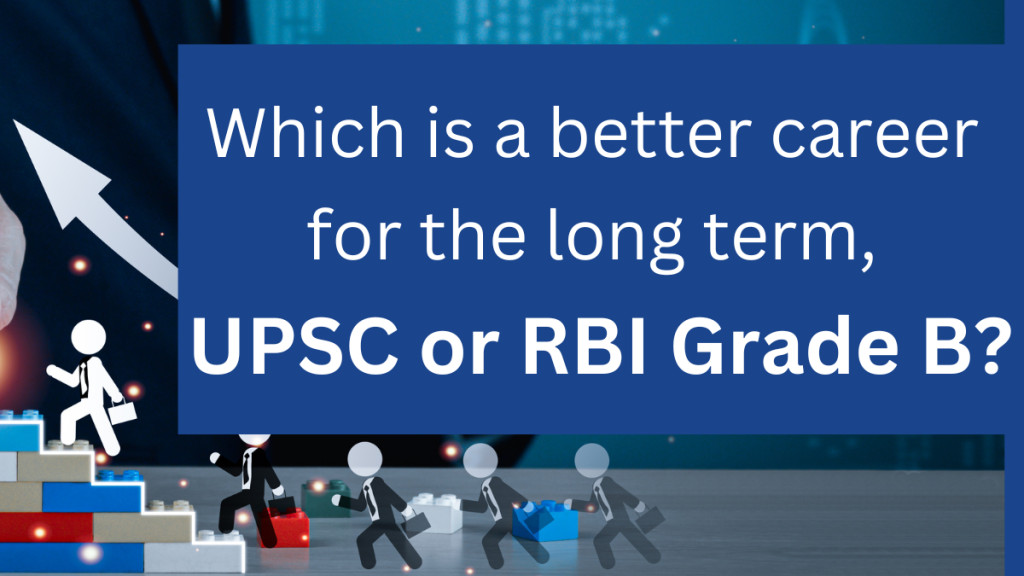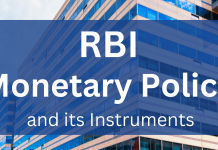In a tumultuous economy and uncertain times, government posts offer stability and assured chances for growth to individuals. No matter how many lucrative private roles may come up, good old government postings are still the backbone of our country.
But with so many kinds of government exams, students often feel confused as to which ones are best suited to them. Each exam has its own syllabus, pattern and recruitment procedure. The decision to select a government service exam to prepare for is critical. Exam preparation takes time and dedication, which are not to be taken lightly.

It is not feasible for anyone to prepare diligently for several exams at once. The burnout would be massive. Students should preserve the scope of their focus and pick a government exam that they feel is best aligned with their aptitude and interests. In this blog we will focus on two of the most well-known exams: UPSC and RBI Grade B and which one of these offers the best career prospects for you in the near future.
Understanding RBI Grade B and UPSC Exams
Whenever we mention government exams, UPSC is the first name that comes to mind. For decades people have aspired to be part of the prestigious Union Public Service Commission to transform their lives and the public’s. The preparation for UPSC is no piece of cake. Out of the 10 lakh students who appear for this exam from all over the country, only a few thousands, accounting for 0.2% of the exam takers, clear it.
The exam is conducted in three stages: prelims, mains, and an interview. Each stage is more challenging than the last. The UPSC Syllabus is so expansive that if students are not busy practicing mock test papers for their optional subjects and other topics, they are reading newspapers and general knowledge magazines to remain updated with current affairs each day.
But UPSC isn’t the only government exam that students are preparing for these days. After UPSC, banking exams draw the largest number of applicants. Banking jobs are highly sought after and almost every other commerce student prepares for one banking exam or the other.
One such banking exam happens to be the RBI Grade B exam. Conducted by another prestigious national body, the Reserve Bank of India, this exam recruits officers for managerial roles. The RBI Grade B exam focuses on the structure of the Indian financial system, understanding primary and secondary markets, macroeconomics, social issues and all topics covering core banking and finance. Padded with the same advantages as other government positions that offer security and a good work life balance, banking exams are another great opportunity for government exam aspirants.
To get a cursory understanding of what the two exams entail, let us take a look at the differences between these two:
| Exam Information | UPSC | RBI Grade B |
| Exam Syllabus | Comprehension Reasoning Decision Making and Problem Solving General Science Basic Numeracy Data Interpretation Current Affairs Indian History Geography Polity and Governance Economic and Social Development Environment Security Ethics and Integrity | Quantitative Aptitude English General Awareness Reasoning Economic and Social Issues Indian Economy Social Structure in India Finance and Management |
| Roles Eligible For | Civil Services Posts IAS IPS IFoS UPSC Posts List under Group A Civil Services IFS IRTS IRS RPF ICAS and more Group B UPSC Posts Armed Forces Headquarters Civil Service DANICS Pondicherry Civil Service Pondicherry Police Service DANIPS | Assistant Manager which will further qualify for: Manager Assistant General Manager Deputy General Manager General Manager Chief General Manager Principal Chief General Manager Executive Director Deputy Governor Governor Central Board of Directors |
The RBI Grade B exam has specific eligibility criteria that ensure candidates possess the necessary qualifications and background for a successful career in central banking. You must possess a bachelor’s degree from a recognized university in any discipline. The minimum marks requirement depends on your category. If you are from the general category, then you need a minimum of 60% marks in your bachelor’s degree. If you belong to the SC/ST/PwBD category, you require a minimum of 50% marks in your bachelor’s degree. Candidates appearing for their final year exams can also apply, but they must produce their degree certificate before joining the program.
| Criteria | Details |
| Nationality | Indian |
| Educational Qualification | Graduation in any discipline (Minimum 60% marks) for General category 50% in any discipline for SC/ST/PwBD category |
| Minimum Age | 21 Years |
| Maximum Age | 30 Years |
| Age Relaxation | Minimum 3 years and maximum 13 years |
Life as an RBI Grade B Officer
RBI Grade B officers are appointed to work with the Reserve Bank of India in roles like support staff, managers, governors, and directors. Qualifying candidates can choose from over thirty RBI departments like Consumer Education and Protection Department (CEPD), Department of Banking Supervision (DBS), Department of Banking Regulation (DBR), Financial Stability Unit (FSU), Department of Economic Policy & Research (DEPR), and so many more. Each of these departments have their own specialised sectors with focused operations.
Working as an RBI Grade B Officer is a rewarding path for those who have a penchant for economics, finance, and want to help keep India’s financial system stable. It’s a job full of mentally stimulating challenges, career growth, and a real chance to shape the country’s economy.
The RBI follows rotational shifts for its officers. This gives you a chance to see many sides of central banking, keeping the job interesting and helping you learn about all parts of the RBI’s work.
The RBI offers great chances for growth and learning. There are plenty of training sessions, workshops, and meetings to keep you up-to-date with banking and finance trends. Moving up the career ladder is clear, letting you reach higher leadership roles within the organization.
Your responsibilities will vary depending on the department you’re assigned to, but generally, they’ll revolve around analyzing economic data, researching trends, and contributing to policy decisions that influence interest rates, liquidity, and inflation control. You’ll also have to monitor commercial banks’ activities, ensuring adherence to regulations, and contributing to financial stability. Overseeing foreign exchange transactions, contributing to initiatives that promote access to financial services for disadvantaged sections of society, and conducting research on economic and financial issues, preparing reports, and providing valuable insights for policy decisions cover most of the work expected from an RBI Grade B officer.
Life as a UPSC Qualifier
Life after cracking UPSC takes a significant turn, ushering in a world of responsibility, prestige, and the ability to make a tangible difference. The initial training will include a comprehensive foundation course at the LBSNAA (Lal Bahadur Shastri National Academy of Administration) in Mussoorie. This rigorous training will equip you with the essential skills and knowledge for administrative roles, including governance, public policy, law, and Indian social realities. post this training, Based on your rank and preferences, you’ll be allotted a specific state cadre. This is where you’ll spend a significant portion of your initial career.
Early on, you’ll likely be posted as a Sub-Divisional Magistrate (SDM) or District Magistrate (DM). This involves overseeing law and order, revenue collection, public infrastructure development, disaster management, and various other responsibilities at the grassroots level. Here, you’ll have a direct impact on the lives of everyday citizens. As you gain experience, you may move into roles like policy formulation and implementation at the state or central government level. This could involve areas like economic development, social welfare, education, healthcare, or environmental protection. Depending on your service and chosen field (IAS, IPS, IFS etc.). You could handle specialized roles in areas like foreign affairs, national security, infrastructure development, or managing public sector undertakings.
Daily life as a UPSC qualifier will be challenging at times. Be prepared for a demanding schedule with long working hours, especially during critical situations. The job often requires travel and working in remote locations. However, the work offers immense variety and the satisfaction of making a real difference. UPSC officers command significant respect and authority within the administrative hierarchy. You’ll be in a position to influence decisions and ensure efficient execution of government policies.
The Answer
Personal circumstances and other reasons greatly guide our career choices. Some of us have the flexibility to go after our aspirations without too many hesitations and some of us might have to wait a little longer. But what does this have anything to do with the question asked in the title of this blog? What is the better career option between UPSC and RBI Grade B for your future?
The above sections must have given you an understanding of what the scope of your work with both government posts would be. When it comes to pay scale, benefits and security, the difference is barely noticeable.
But to find the answer to this question, the key difference that you need to focus on is how your job role will fulfil you and give you an opportunity to apply your strengths. Sounds cliche, but the growing incidence of people with considerable salary packages quitting their jobs to pursue a life that fulfils them is a testament to this. Let’s make finding the answer fun.
In the following table, you can choose one of the two columns under UPSC and RBI Grade B. Whichever column has the highest number of your preferences, is what is best for your career in the long term!
| Category | UPSC | RBI Grade B |
| Skills Required | Leadership Decision-Making Planning and Organization Administrative Skills Interpersonal Skills Empathy Project Management Policy Analysis Negotiation Adaptability Disaster Management | Analytical Skills Decision-Making Data Analysis Policy Formulation Regulatory Expertise Risk Management Financial Inclusion Communication with Diverse Audiences |
| Scope of Services | District Administration Public Infrastructure Development Policy Formulation and Implementation Development and Execution of National Programs Specialized Roles (Later Career) | Monetary Policy Financial Markets Banking Regulation and Supervision Foreign Exchange Management Financial Inclusion & Rural Development Research and Analysis |
Prepping for RBI Grade B Exams with ixamBee
ixamBee offers a comprehensive RBI Grade B Online Course to streamline your RBI Grade B exam preparation. ixamBee provides a structured study plan with video lectures, study notes, and practice questions covering all tested subjects.
You’ll benefit from RBI Grade B mock tests mirroring the actual exam format, detailed performance analysis to pinpoint weaknesses, and sectional tests for targeted practice. You can also use our RBI Grade B Previous Year Papers to practice previous exam papers to facilitate your exam preparation. Our expert faculty provides guidance through live doubt clearing sessions and online support. Additionally, some programs might include features like current affairs updates, mentorship from toppers, and online communities for peer interaction and motivation.
By combining these elements, ixamBee equips you with the knowledge, skills, and confidence to conquer the RBI Grade B exam. Explore our website for program details and pricing, and while ixamBee offers valuable resources, your dedication and consistent effort remain paramount for success.
Conclusion
A UPSC civil servant or RBI Grade B officer, whichever of these careers you choose, the best long term career path is not given to us by choosing a field with the most perks, but it is instead built. A long-term career is paved by dedicated hard work and excellence day in and day out no matter what you do. This may not be the direct answer you were looking for but we’re sure that as long as your heart is in it, you will be the best at what you do.
To help you prepare 50% faster for competitive exams, ixamBee provides a free Mock Test Series and all the Current Affairs in English and Current Affairs in Hindi in the BeePedia capsules for GA Preparation. You can also get the latest updates for Bank PO, Bank Clerk, SSC, RBI Grade B, NABARD, and Other Government Jobs.
Also Read:
Everything to Know About the IBPS RRB PO Exam Notification 2024
RBI Moves 100 Tonnes of Gold to India: What It Means
Five Key Mistakes to Avoid for a High SSC CGL Exam Score














